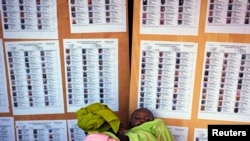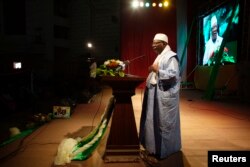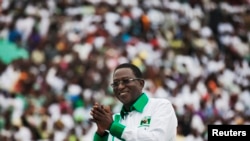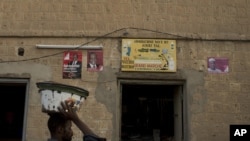BAMAKO —
Mali goes to the polls Sunday to choose a new president. There are 27 candidates on the ballot. It's a mix of long-time political heavyweights and relative newcomers. There are several clear frontrunners, almost all of whom have held high-level government posts.
Mali is now a year and a-half into an unprecedented crisis. A new Tuareg rebellion kicked off in the north in January 2012 followed by a military coup in the south two months later. Jihadist groups then occupied the north until they were pushed out by a French-led military intervention that began in January of this year and is now being transformed into a massive U.N. mission.
Some in Mali blame those who led the country over the past decade for getting them into this mess. Others say the country needs an experienced leader to get them through it.
Former officials in the running
The crisis has shuffled things around a bit politically, and no one is ruling out any surprises in Sunday's vote. However, the candidate field is dominated by former ministers and prime ministers, like Ibrahim Boubacar Keita.
IBK, as he is more commonly known by his initials, was a longtime opponent of ousted president Amadou Toumani Toure, also know by his initials ATT.
Keita served as president of the National Assembly until 2007. He has built a reputation for tough talk and fierce nationalism, which appears to be resonating with voters.
He told VOA that too much is at stake for the old ways of governing to continue.
He says Malians have a choice: Who is capable of making these big decisions that the country needs? He says who is credible and not corrupt? He says we cannot put this job into dirty hands. He says I will have zero tolerance for corruption, and people know me in this country - what I say, I do.
Other ex-prime ministers among the favorites are Soumana Sacko and Modibo Sidibe.
Sacko is an economist known for his work with international development agencies. Sidibe is a policeman by training. He was close to the now ousted president Toure and served as his prime minister until 2011.
Similar platforms
The 27 candidates are all promising pretty much the same things. At the top of the list are national reconciliation and an overhaul of the army, as well as fighting corruption and creating jobs.
Another key frontrunner is Soumaila Cisse, a technocrat from the Timbuktu region who served in the government of Oumar Konare in the 90s and then chaired the West African Monetary Union for seven years until 2011.
His supporters say they trust his track record.
One of his supporters, Amady Diallo, says Cisse has held a lot of posts and he has managed them well. He has experience.
Another top contender is Dramane Dembele, a geologist with limited government experience but the support of the country's largest political party, ADEMA.
ADEMA has been racked by internal divisions for years. The choice of a relative outsider appears to have been no accident.
Dembele calls himself the "new blood" the country needs.
Asked about his limited experience, Dembele says he works as part of a collective, a team, and it is that team that will win.
There are a few other first-time presidential candidates creating a buzz.
Moussa Mara is one of the youngest candidates at just 38 years old. He has been a rising star on Mali's political scene since being elected the mayor of Bamako's Commune IV in 2009.
One women on ballot
The only woman on the ballot, Aichata Chada Haidara, is a National Assembly representative from the northern town of Bourem. She rose to prominence last year for her outspoken condemnation of Tuareg rebels and Islamists occupying the north.
She has pledged, among other things, to get more women into government.
She says why are there not more female candidates for the presidency? Women should step up. She says women should believe in themselves and they should fight for it because it is too easy to just sit there and say it should be given to them. She says you have to go get it.
If no candidate wins a clear majority in Sunday's vote, the two top-scoring candidates will head to a runoff on August 11.
Amadou Maiga contributed reporting in Bamako.
Mali is now a year and a-half into an unprecedented crisis. A new Tuareg rebellion kicked off in the north in January 2012 followed by a military coup in the south two months later. Jihadist groups then occupied the north until they were pushed out by a French-led military intervention that began in January of this year and is now being transformed into a massive U.N. mission.
Some in Mali blame those who led the country over the past decade for getting them into this mess. Others say the country needs an experienced leader to get them through it.
Former officials in the running
The crisis has shuffled things around a bit politically, and no one is ruling out any surprises in Sunday's vote. However, the candidate field is dominated by former ministers and prime ministers, like Ibrahim Boubacar Keita.
IBK, as he is more commonly known by his initials, was a longtime opponent of ousted president Amadou Toumani Toure, also know by his initials ATT.
Keita served as president of the National Assembly until 2007. He has built a reputation for tough talk and fierce nationalism, which appears to be resonating with voters.
He told VOA that too much is at stake for the old ways of governing to continue.
He says Malians have a choice: Who is capable of making these big decisions that the country needs? He says who is credible and not corrupt? He says we cannot put this job into dirty hands. He says I will have zero tolerance for corruption, and people know me in this country - what I say, I do.
Other ex-prime ministers among the favorites are Soumana Sacko and Modibo Sidibe.
Sacko is an economist known for his work with international development agencies. Sidibe is a policeman by training. He was close to the now ousted president Toure and served as his prime minister until 2011.
Similar platforms
The 27 candidates are all promising pretty much the same things. At the top of the list are national reconciliation and an overhaul of the army, as well as fighting corruption and creating jobs.
Another key frontrunner is Soumaila Cisse, a technocrat from the Timbuktu region who served in the government of Oumar Konare in the 90s and then chaired the West African Monetary Union for seven years until 2011.
His supporters say they trust his track record.
One of his supporters, Amady Diallo, says Cisse has held a lot of posts and he has managed them well. He has experience.
Another top contender is Dramane Dembele, a geologist with limited government experience but the support of the country's largest political party, ADEMA.
ADEMA has been racked by internal divisions for years. The choice of a relative outsider appears to have been no accident.
Dembele calls himself the "new blood" the country needs.
Asked about his limited experience, Dembele says he works as part of a collective, a team, and it is that team that will win.
There are a few other first-time presidential candidates creating a buzz.
Moussa Mara is one of the youngest candidates at just 38 years old. He has been a rising star on Mali's political scene since being elected the mayor of Bamako's Commune IV in 2009.
One women on ballot
The only woman on the ballot, Aichata Chada Haidara, is a National Assembly representative from the northern town of Bourem. She rose to prominence last year for her outspoken condemnation of Tuareg rebels and Islamists occupying the north.
She has pledged, among other things, to get more women into government.
She says why are there not more female candidates for the presidency? Women should step up. She says women should believe in themselves and they should fight for it because it is too easy to just sit there and say it should be given to them. She says you have to go get it.
If no candidate wins a clear majority in Sunday's vote, the two top-scoring candidates will head to a runoff on August 11.
Amadou Maiga contributed reporting in Bamako.







